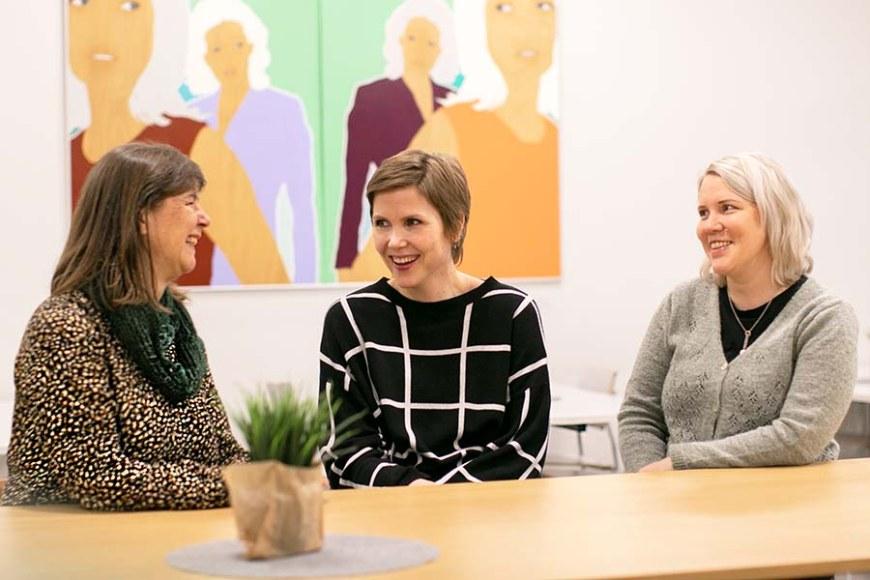Professional teachers to work as change agents for sustainable future

Sustainable future calls for extensive social changes and teachers have a key role in it. The international EduSTA project aims at ensuring that professional teachers’ sustainability competence is identified and recognised in different fields of education. The total budget of the project is almost €1.6 million.
In three years, for example Dutch and Spanish teachers can show their sustainable development competence with badges in Finland. This also encourages international mobility.
”This is a new and important opening”
Project Specialist Paula Ranne and Senior Lecturer Eveliina Asikainen are sincerely happy about the new project. Many worked hard for the project.
“I had to rub my eyes when we were notified of the funding – this is such a new opening. We were just congratulated by the European Commission. They invited us to an event where Mariya Gabriel, Commissioner for Innovation, Research, Culture, Education and Youth, presents the new Teacher Academies projects. It sounded that they were as excited about the opening as we are,” states Ranne with content.
Asikainen tells that this was the first Teacher Academies application.
“It is really great that we succeeded. EU wants to strengthen European education through the Teacher Academies funding and teachers are an important part of the development. The project also offers teacher educators the possibility to create a more sustainable future. Europe needs labour who master sustainable development themes both contentually and pedagogically.”
According to Ranne, EU also focuses more on professional education.
“Education has to respond to working life needs. EU wants to support development of professional education and professional teachers to make them understand the importance of their work. This is related to appreciation and attraction of teachers’ work,” Ranne adds.
”Teachers are future makers”
EduSTA gathers together five teacher education institutions from Finland, Sweden, the Netherlands, Spain and the Czech Republic. Tampere Vocational College Tredu from Finland and the Association for Teacher Education ATEE from Belgium also participate.
According to Asikainen, professional teacher education is heterogenous in Europe. In Finland, it is well-organised and esteemed.
“In Finland, five universities of applied sciences offer professional teacher education equally with other fields of education. This is not self-evident in Europe. Teachers are always future makers and now we make them sustainable development makers,” Asikainen tells.
Ranne is of the same opinion.
“Teachers are critically important change makers in the society. Teachers’ profession is universal in different fields of education and many of teachers’ competences are also universal from basic education to professional education.”
Teachers benefit from the badge system
Small-scale modules, such as microcredentials, are developed in Europe and around the world alongside degree education. In the EduSTA project, the badge thinking is combined with microcredentials. The idea is that accumulated competence can flexibly be demonstrated through microcredentials, which may in this case consist of badges.
According to Ranne, compliance with the joint European definition of microcredentials supports their scaling and use in different educational communities and countries.
“We will create the badge system under the management of Principal Lecturer Sanna Ruhalahti. We will outline what teachers’ sustainable development competence is at different education levels. We will define what teachers have to master in order to educate sustainable future professionals and ways of demonstrating the competence. We will first launch this in the network and later all educators will benefit of it in different countries ,” Asikainen tells.
Finnish professional teacher education is an export product
TAMK has experience in sustainable development pedagogy, badges and Erasmus+ projects. Ranne praises TAMK’s professional teacher education and School of Pedagogical Innovations and Culture.
“It is full of brilliant pedagogical professionals who look outwards. Director Hanna Ilola encourages us to do this bigger and self-confidently also internationally. In addition to contentual competence, we invest in network-based operation and dissemination of Finnish know-how.”
The funding application was demanding. Asikainen thanks TAMK’s skilful external funding specialists.
“Paula courageously started to search for international partners. We noticed that a badge-based competence recognition system was a new and even challenging way of thinking for many.”
Ranne reminds that the work only begins here.
“This calls for large investments in the future, Sustainable development thinking has to be crosscutting in all operations in all fields of education. It is the core but it is not yet self-evident. That is what we want to change.”
Asikainen agrees that the topic easily remains on the general or field-specific level.
“Pedagogical competence in sustainable development includes that we teachers tolerate that we are challenged by new information in uncertain situations. The world changes and we can still act.”
Sustainable development competence becomes mainstream
The EduSTA project also pushes the matter forward with determination and commitment on the institutional level. Sustainable development competence becomes mainstream and is not superimposed.
Ranne develops visions for the future.
“In three years, we have many teachers who are confident of their sustainable development competence and ready to respond to tricky societal challenges. They are active change agents and messengers and the message has reached students, too. Educational communities also commit themselves to sustainable development more comprehensively. We have managed to raise the teacher education profile and make it a key sustainable development agent. The whole community is committed to these objectives and all are excited about them. It bodes well.”
Further information:
Hanna Ilola
Director
School of Pedagogical Innovations and Culture
Tampere University of Applied Sciences
hanna.ilola [at] tuni.fi (hanna[dot]ilola[at]tuni[dot]fi), +358 400 263 675
Eveliina Asikainen
Senior Lecturer
School of Pedagogical Innovations and Culture
Tampere University of Applied Sciences
eveliina.asikainen [at] tuni.fi (eveliina[dot]asikainen[at]tuni[dot]fi), +358 50 5958 775
Photo: Renata Brito
Text: Hanna Ylli





